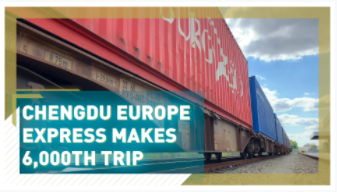"We want to grow Arm and make it become even greater."
The CEO of U.S. multinational, Nvidia, Jensen Huang, was in a confident mood after the $40 billion purchase of chip designer Arm from Japan's SoftBank, which has sparked concerns about Arm's independence and its future in the UK.
"The UK government will realize that we are making a very significant investment in the UK," said Huang, stopping short of making formal job guarantees and stating that talks with the UK government had yet to begin in earnest.
His words seemingly fell on deaf ears as it was announced on Monday, that UK ministers will investigate the deal, with pressure on them to deny the purchase on national security grounds, backing instead to float Arm on the stock market... watch this space.
In today's newsletter we have an interview with the leading engineer of an innovative and environmentally friendly new airplane, the "Flying V." We have footage from the 8,000 kilometer journey of the Chengdu Europe Express as well as the latest headlines from the world's biggest business stories.
Happy reading,
Daniel Harries
Digital correspondent
P.S. Did someone forward this to you? Sign up here
Picture credit: VCG/Alexander Mokhov

Chinese President Xi Jinping held virtual talks with German Chancellor Angela Merkel, European Commission President Ursula Von Der Leyen and European Council President Charles Michel. The two sides agreed to speed up negotiations on a crucial China-EU investment deal, aiming to conclude talks by year end.
The owner of TikTok has chosen Oracle over Microsoft as the American tech partner that could help keep the popular video-sharing app keep running in the U.S., according to sources quoted by Reuters.
Gilead Sciences will acquire biotech company Immunomedics for $21 billion, a move that will strengthen its cancer portfolio by gaining access to a promising drug.
The CEO of Irish airline Ryanair, Eddie Wilson, expects the European Commission this week to unveil a new system of COVID-19 travel advice that will open up most regions of the continent to travel without quarantine.
Amazon will hire another 100,000 people to keep up with a surge of online orders, according to Alicia Boler Davis, who oversees Amazon's warehouses. The company intends to offer $1,000 sign-on bonuses in some U.S. cities where it may be harder for it to find workers, including Detroit, New York, Philadelphia and Louisville.
Thailand's Central Bankruptcy Court gave the go-ahead to financially ailing Thai Airways International to submit a business reorganization plan.
Facebook says its users will now be able to watch videos with their friends online using the social media company's Messenger app, enabling them to see reactions in real time.
Canadian private security company Garda World Security says it has offered to buy British rival G4S for about $3.8 billion.
London City Airport said it needs to cut up to 239 jobs, 35 percent of its staff, as part of a restructuring plan, as the coronavirus pandemic continues to hit passenger numbers.
Operating since 2013, the Chengdu Europe Express now makes five trips a week between China and the Dutch city of Tilburg. Each train can take 80 containers compared with around 21,000 by cargo ship – but they can do the journey in 15 days, a month faster.
01:51

As the weird and wonderful Flying-V took off for the first time, CGTN Europe spoke to the project's chief engineer, Roelof Vos, about how this aircraft could revolutionize the aviation industry.
What makes the Flying-V unique?
The Flying-V is different from other airplanes because it doesn't have a separate fuselage. So all the passengers are located inside the wings and therefore it's a little bit smaller and it's a little bit lighter weight than other airplanes, and it consumes much less fuel on long trips, about 20 percent we expect.
What were the concerns before its maiden flight?
There were a couple of concerns with respect to the first flight. First one was, will it actually take off? So will it rotate on the runway? And will it actually get airborne? The second one was, will it be stable in the air? And the third one: would it be controllable? So would the pilot be able to control the airplane to his liking? And, fortunately, all of these things could be answered with a firm 'yes.' It did take off. It was stable and it was controllable.
How ecologically friendly is the design?
So the airplane itself demands 20 percent less energy to fly the same distance with the same number of passengers as a state-of-the-art airplane is doing right now with the same engines. That's important. We are looking into including hydrogen as a fuel to see if the Flying-V would be a good or better platform than a tube-and-wing airplane. So we're using part of the internal volume to store liquid hydrogen – that's the cryogenic form of hydrogen – and then combust that hydrogen in a turbofan engine.
As the leaders of China and the EU hold talks at a virtual summit, the chart below shows the balance of trade between the two powers.
Source(s): Reuters
,AP